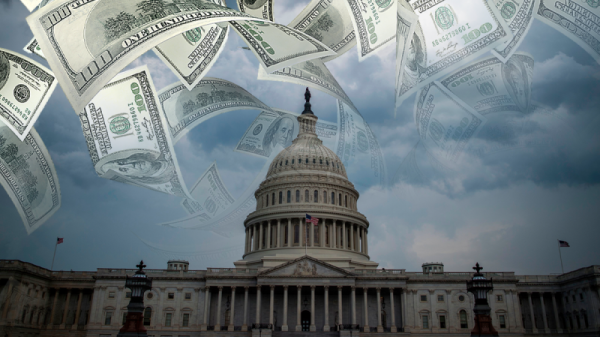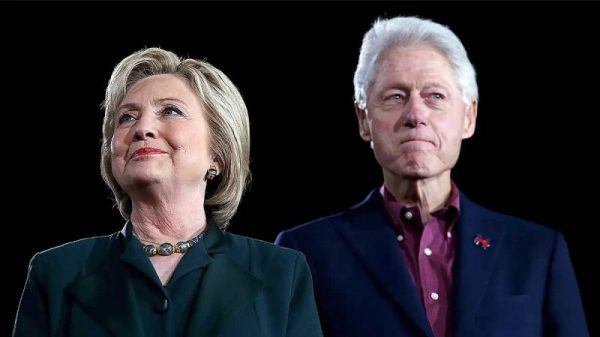Americans’ support for a ban of TikTok has crumbled this year, even among Republicans, further undermining a Republican-led push to outlaw the popular video app nationwide.
Roughly 38 percent of the U.S. adults polled by Pew Research Center this fall said they supported a federal TikTok ban, down from 50 percent in March, according to a survey released Monday.
While GOP leaders have furiously campaigned this year to ban the app, their constituents remain unsure. Republicans’ rate of support for a ban dropped from 60 to 50 percent, and those unclear about the value of a ban jumped from 21 to 30 percent, the Pew survey found.
The survey findings suggest that a growing number of Americans dislikes the idea of the U.S. government banning an app used for entertainment and self-expression.
TikTok has faced years of attacks from political critics in Congress and statehouses, as well as its social media rivals in Silicon Valley. But the poll shows that efforts to ban it will face a huge challenge in persuading voters, many of whom use the app themselves. TikTok says it has 150 million users in the United States.
TikTok’s critics have argued that its ownership by the China-based tech company ByteDance makes it a national security threat. Republican presidential candidates Nikki Haley and Vivek Ramaswamy have sparred over the app during debates, with Haley calling it “one of the most dangerous social media assets that we could have.”
But even those Americans who know about ByteDance’s link to China are unconvinced that a ban is worthwhile. Their support for a ban has dropped to 43 percent, Pew said, down from 60 percent in March.
More Democrats now oppose a TikTok ban than support one, a change since Pew’s last survey. The app has also gained more vocal support among liberals in Washington, including from prominent Democratic politicians who have created their own accounts.
Opposition to a ban among TikTok users has remained unsurprisingly high. But even among U.S. adults who don’t use TikTok, support for a ban has eroded from 60 to 47 percent.
Among American teens, support for a ban is even lower. Fifty percent of respondents between the ages of 13 and 17 said they oppose a ban, compared with 18 percent who support it. About 44 percent of teens who said they lean Republican oppose a ban, while 24 percent support it.
Pew, which polled more than 8,800 U.S. adults and 1,400 teens for the survey in September and October, found that TikTok remains one of the most popular apps among teens, with 17 percent saying they use it “almost constantly.”
Its popularity is second only to YouTube, which roughly 70 percent of teens said they visit at least once a day.
In March, when TikTok chief executive Shou Zi Chew was grilled for five hours on Capitol Hill about the company’s Chinese ownership, critics argued that a ban was the only way to counteract the risks that the app could be used for propaganda or espionage.
But ByteDance and the Biden administration continue to negotiate a potential deal that would resolve national security concerns while allowing the app to remain operating in the United States.
Some administration officials have voiced unease about pushing to ban a popular app they could use to reach voters during the 2024 campaign and beyond. In a March interview, Commerce Secretary Gina Raimondo told Bloomberg News that a TikTok ban would “literally lose every voter under 35, forever.”
An effort to ban the app at the state level in Montana suffered a setback last month when a federal judge there ruled that the move probably overstepped state power, infringed on Americans’ First Amendment protections and violated “the Constitution in more ways than one.” He issued a temporary injunction blocking the law from going into effect Jan. 1, pending a full trial of the issues.
TikTok has faced criticism recently for the prevalence of pro-Palestinian videos, even though other platforms, such as Facebook and Instagram, offer similar volumes of content.
But some of the most prominent moves to tear the app down have backfired, even among conservative supporters. When Haley last week claimed on a Republican debate stage that “for every 30 minutes that someone watches TikTok every day, they become 17 percent more antisemitic” — a misrepresentation of a widely disputed study — some conservative commentators, such as Matt Walsh, lampooned the idea as “the fakest statistic I’ve ever heard in my life.”
Even some longtime Republican critics of TikTok have changed their tune. Ramaswamy, a few days after calling the app “digital fentanyl from China,” created an account there and has since posted 34 videos. He defended the move as “reaching the next generation of young Americans where they are.”
Americans’ support for a ban of TikTok has crumbled this year, even among Republicans, further undermining a Republican-led push to outlaw the popular video app nationwide.
Roughly 38 percent of the U.S. adults polled by Pew Research Center this fall said they supported a federal TikTok ban, down from 50 percent in March, according to a survey released Monday.
While GOP leaders have furiously campaigned this year to ban the app, their constituents remain unsure. Republicans’ rate of support for a ban dropped from 60 to 50 percent, and those unclear about the value of a ban jumped from 21 to 30 percent, the Pew survey found.
The survey findings suggest that a growing number of Americans dislikes the idea of the U.S. government banning an app used for entertainment and self-expression.
TikTok has faced years of attacks from political critics in Congress and statehouses, as well as its social media rivals in Silicon Valley. But the poll shows that efforts to ban it will face a huge challenge in persuading voters, many of whom use the app themselves. TikTok says it has 150 million users in the United States.
TikTok’s critics have argued that its ownership by the China-based tech company ByteDance makes it a national security threat. Republican presidential candidates Nikki Haley and Vivek Ramaswamy have sparred over the app during debates, with Haley calling it “one of the most dangerous social media assets that we could have.”
But even those Americans who know about ByteDance’s link to China are unconvinced that a ban is worthwhile. Their support for a ban has dropped to 43 percent, Pew said, down from 60 percent in March.
More Democrats now oppose a TikTok ban than support one, a change since Pew’s last survey. The app has also gained more vocal support among liberals in Washington, including from prominent Democratic politicians who have created their own accounts.
Opposition to a ban among TikTok users has remained unsurprisingly high. But even among U.S. adults who don’t use TikTok, support for a ban has eroded from 60 to 47 percent.
Among American teens, support for a ban is even lower. Fifty percent of respondents between the ages of 13 and 17 said they oppose a ban, compared with 18 percent who support it. About 44 percent of teens who said they lean Republican oppose a ban, while 24 percent support it.
Pew, which polled more than 8,800 U.S. adults and 1,400 teens for the survey in September and October, found that TikTok remains one of the most popular apps among teens, with 17 percent saying they use it “almost constantly.”
Its popularity is second only to YouTube, which roughly 70 percent of teens said they visit at least once a day.
In March, when TikTok chief executive Shou Zi Chew was grilled for five hours on Capitol Hill about the company’s Chinese ownership, critics argued that a ban was the only way to counteract the risks that the app could be used for propaganda or espionage.
But ByteDance and the Biden administration continue to negotiate a potential deal that would resolve national security concerns while allowing the app to remain operating in the United States.
Some administration officials have voiced unease about pushing to ban a popular app they could use to reach voters during the 2024 campaign and beyond. In a March interview, Commerce Secretary Gina Raimondo told Bloomberg News that a TikTok ban would “literally lose every voter under 35, forever.”
An effort to ban the app at the state level in Montana suffered a setback last month when a federal judge there ruled that the move probably overstepped state power, infringed on Americans’ First Amendment protections and violated “the Constitution in more ways than one.” He issued a temporary injunction blocking the law from going into effect Jan. 1, pending a full trial of the issues.
TikTok has faced criticism recently for the prevalence of pro-Palestinian videos, even though other platforms, such as Facebook and Instagram, offer similar volumes of content.
But some of the most prominent moves to tear the app down have backfired, even among conservative supporters. When Haley last week claimed on a Republican debate stage that “for every 30 minutes that someone watches TikTok every day, they become 17 percent more antisemitic” — a misrepresentation of a widely disputed study — some conservative commentators, such as Matt Walsh, lampooned the idea as “the fakest statistic I’ve ever heard in my life.”
Even some longtime Republican critics of TikTok have changed their tune. Ramaswamy, a few days after calling the app “digital fentanyl from China,” created an account there and has since posted 34 videos. He defended the move as “reaching the next generation of young Americans where they are.”





















